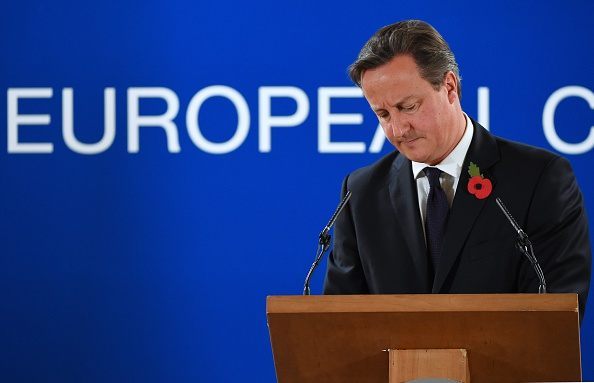Prime Minister David Cameron plans to lift a ban on the European Commission spending millions of pounds of European tax payer money on pro-EU propaganda in the run up to an EU referendum.
The government bill will have it’s second reading at the House of Commons on Tuesday, paving the way for the In/Out referendum in 2017, if not before. But the government faces a potentially significant rebellion, thanks to plans included by Downing Street to defenestrate the 28 day ‘purdah’ period , first reported by Breitbart London.
The rules prevents government departments from making announcements with the potential to sway the outcome.
In doing so, it is breaking from the precedent set by both the Scottish independence referendum last year, and the Alternative Voting system referendum which took place in 2011, as well as by General Elections. The Yes and No campaigns will have their budgets capped during the campaign period.
But the moves have provoked outrage on the Conservative Party’s backbenches, with Owen Paterson, the former environment secretary, said: “This is a massive concern. Local government, central government and above all European government will be able to pump out huge amounts of information at taxpayers’ expense. That is completely wrong.
“The purdah rule was brought in for a very good reason: to allow a fair choice on the basis of a fair distribution of material. You cannot have unlimited local government, national government or European government material distributed right up to polling day. It’s quite clearly wrong. It drives a coach and horses through the spending limits.”
Last night, Conservative MPs vowed to rebel on Tuesday to force the rule to be reinstated. Opposition to the move is understood to be felt throughout the party including at Cabinet level. Two ministers are already considering resigning if Cameron does not let them join the ‘No’ campaign, in favour of an exit from the EU, when the time comes.
Thanks to the wafer thin majority that David Cameron holds, a rebellion on Tuesday has the potential to succeed. Already, more than 50 backbench Conservatives have set up a group to campaign for an exit from the EU if “fundamental change” is not delivered.
The group has been co-founded by Steve Baker, the MP for Wycombe, who said: “I’m profoundly concerned that taxpayers’ money ought not to be used to argue for one side in this campaign. I would like the government to amend the bill so we don’t have an unpleasant public falling-out over it.
“It looks increasingly like the Establishment across the UK and Europe wants to briskly bounce the British people into a ‘yes’ vote. It’s not acceptable.”
Opposition to the wording of the bill had already been mounted by the UK Independence Party. Last week, UKIP’s Chairman Steve Crowther said: “[The Bill] fails to mandate a period of ‘purdah’, normal in elections, to prevent the government from making announcements in the run-up which might affect the result.
“With no guarantee from the Government that they will set and enforce fair and equal spending limits, this omission leaves the door open for the government or indeed the European Union’s agencies to make ever more appealing announcements, right up to polling day, to ‘nudge’ people towards a vote to stay in.”
Criticism has also been made over the wording of the referendum question, which asks: “Should the United Kingdom remain a member of the European Union?” This makes the campaign to remain within the European Union the Yes campaign, whilst those who want to leave will be campaigning for a No result.
But critics have said that asking voters to vote Yes to the status quo gives the In campaign an unfair psychological advantage.“The people have waited 40 years for this opportunity and they must be given a free, fair and open choice to decide whether we stay in the EU, or reclaim our ability to govern ourselves. The government will not be forgiven if they play tricks with it,” said Mr Crowther.
But a Downing Street spokeman has claimed that the EU referendum is different from both the AV and Scottish independence referenda, as the former pitched Conservative ministers against Liberal Democrat minsters, whilst the latter pitched the Scottish and British governments against each other.
Conversely, the spokesman said: “The restrictions have been lifted because this referendum is an absolutely fundamental part of our manifesto. The idea that the government should be restricted in the crucial final weeks on a key manifesto commitment and be made to switch to neutral wouldn’t make much sense.”
The rebellion comes as No campaigners voice concerns that the Yes campaign is already out of the starting blocks, giving them a lead. According to the Sunday Times, PR man Roland Rudd has already raised more than £100,000 of a £500,000 target to pay for a campaign chief to run the Yes campaign.
UKIP’s leader Nigel Farage yesterday announced that he was starting a campaign for a British exit and urged Tory Eurosceptics to join him. He warned that waiting for Cameron to return from Brussels with a deal before the campaign starts will be leaving it too late. “The ‘no’ campaign simply wouldn’t have time to mobilise,” he said.
“I’m not going to sit around and wait until Christmas. We’ve got to get cracking. I see Ukip as the only Eurosceptic organisation in Britain that has a big membership, nearly 50,000 people. We’re the people that can fight the ground game. We’re the people that can hold a massive series of public meetings, which I’m going to be doing from September.
“We are going to be up against not just the British political establishment, not just the giant multinationals, but the European Commission and the whole of the Brussels structure.”

COMMENTS
Please let us know if you're having issues with commenting.